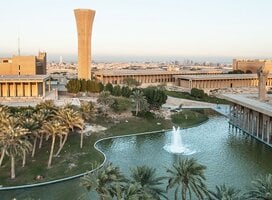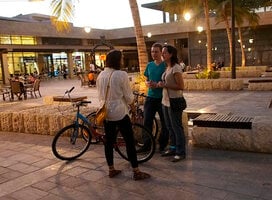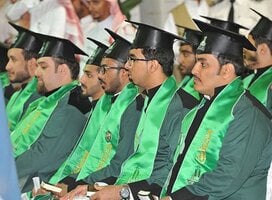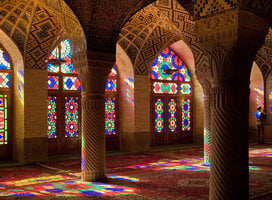Direct Enrollment Study Abroad in Saudi Arabia
Saudi Arabia hasn't traditionally been known as a destination for international students, but that perception is starting to change. The Saudi state has invested heavily in university education over the last decade, and enrollment has increased significantly as a result. In 2013 the Kingdom was home to 25 public universities, enrolling a total of 1,165,091 students (about 1 million undergrads). No matter where you end up, you'll have a lot of classmates"
The number of universities has also grown, with new universities springing up through mergers or campus upgrades. Public universities, which operate under royal decree, are typically larger than private universities, and house most of the country's major academic research. Some are single-sex, while others offer co-ed enrollment and segregated classes. Private universities, which are overseen by the Ministry of Higher Education, tend to be smaller and more specialized.
Direct Enrollment
International students who want to enroll directly in a Saudi university should make sure to check deadlines before beginning the application process. Deadlines vary, though fall semester applications generally close in late spring (April or May).
To apply, you'll need the same kind of materials you'd submit to a university in your home country: your most recent academic degree or transcript, letters of recommendation, test scores when applicable and a resume. Universities that offer instruction in English may require proof of English proficiency -- usually through TOEFL or IELTS test scores, though this requirement is typically waived for citizens of countries where English is the most widely spoken language. Although many universities do offer English instruction, Arabic is the main language of instruction throughout the country, so be aware of this when selecting courses.
Direct Exchange
Direct exchange is often a good option for studying abroad, since it allows you to coordinate everything through your home institution, and helps ensure your studies will count for credit toward your major.
While many universities, both in the U.S. and around the world, maintain networks of exchange with foreign institutions, there unfortunately aren't many options in the U.S. right now for direct exchange with institutions in Saudi Arabia. This doesn't mean it's impossible to do a direct exchange program in Saudi Arabia, but you should talk to your home university's study abroad office to find out if any Saudi schools are included as direct exchange options, or if you could set up your own exchange directly with the school.
Third-Party Provider
Studying abroad through a third-party provider -- either a company or another university's study abroad program -- can save you a lot of stress and make the whole process much easier. These organizations are experts at helping students adjust to their host universities and countries, and can provide an extra layer of security and support, taking care of all kinds of logistics. like visas, housing, and registration.
Third-party providers do charge a fee for their programs, but many students feel it's worth it for the convenience and peace of mind that comes from having someone else deal with most of the headaches. If that sounds good to you, see if your university's study abroad/international office can recommend any providers for you. Before you commit to any provider, it's always a good idea to read reviews online or talk to alumni of the program to get a better idea of what to expect and figure out if it's the right fit for you.
Tuition
Despite the country's wealth, higher education costs in Saudi Arabia are generally lower than at many universities in the U.S. and the rest of Western Europe. Like just about everywhere else in the world, public universities are more affordable than private ones. The quality of education at public Saudi universities is overall quite high, so they're worth looking into if you're prioritizing your budget. Public universities are often free or a few thousand dollars a year, while tuition at a private institution can cost anywhere between $6,000 to $15,000 a year.
Cost of Living
The cost of living in Saudi Arabia isn't as high as you might expect (or as high as what you'd encounter in nearby Gulf states). Even in the capital of Riyadh, it's possible to find good housing in a decent area for anywhere between $600 and $1,000 a month, and you can save even more by living with roommates or shared housing.
Some universities do provide student housing options, which can include apartment-style housing or individual condo units. If you receive financial aid, it might cover your housing costs; otherwise, expect to pay up to about $700 a month for university housing, depending on where you're living.
You'll also need to budget money for books, transportation and other expenses like health insurance (if required by your university). Then, of course, you'll need some spending money for exploring your new home. Surprisingly, Riyadh actually isn't the country's most expensive city -- it's actually more affordable than other major urban areas like Mecca, Medina and Jeddah.
Visas
Students planning to study in Saudi Arabia will need to get a visa before arriving. Acceptance to a Saudi university is no guarantee that your visa will be approved, so make sure you follow all the steps in the process. If the possibility of visa rejection isn't enough motivation, there's also the stiff price tag -- under new regulations, a yearlong visa in Saudi Arabia now costs about $500, and you definitely don't want to be paying that fee more than once.
Applicants need a passport valid for at least 12 months from the date of entry, with at least two blank adjacent pages. You will also need the electronic authorization and an official invitation letter from the Saudi university. Other requirements include: local police clearance, medical reports signed and stamped by a doctor, a visa questionnaire, original birth certificate and high school diploma. For a complete list of required documents, consult the Saudi embassy site.
Student visas generally allow for multiple re-entries, as long as the student doesn't leave the Kingdom for more than 13 months in between.
Scholarships
The free tuition offered at some Saudi universities might be even better than a scholarship. Other than that, unfortunately, there aren't a lot of scholarships out there for study in Saudi Arabia. It's not impossible, though, so be sure to look through the scholarships listed on the Go Overseas scholarship page, and ask your home university and study abroad provider (if applicable) if they know of any scholarships you might qualify for.
Saudi universities are actively trying to attract more international students, so they may also have scholarships or other funding opportunities available to you. For example, the KAUST Fellowship is awarded to every accepted student and supports students through their full graduate studies program at the King Abdullah University of Science and Technology (KAUST). The fellowship tuition and providing a monthly living stipend ranging between $20,000 and $30,000 annually; housing; medical and dental coverage; and relocation assistance, according to KAUST's website. Not every scholarship will be so generous, but it's always worth contacting the international student office at the university where you'll be studying to find out if they have any available funding.
Oldest University
The kingdom's oldest university is King Saud University, a public university in Riyadh. It was created by Saudi Arabia's founder, King Saud bin Abdulaziz Al Saud, in 1957 as Riyadh University, with the goal of filling a shortage of skilled, college-educated workers in Saudi Arabia at the time. In 1982, the university was renamed King Saud University.
Currently, about 55,000 students (both men and women) attend KSU. As a public university, most courses are free of charge, and undergraduate instruction is offered in either English or Arabic, depending on the specific major. KSU is especially well-known for its medical programs, which attract students from across the region.
Biggest University
King Abdulaziz University (KAU) is the country's largest university, with over 180,000 students. It was founded in 1967, also by King Saud, as a private university that aimed to educate the population in Saudi Arabia's western region, and joined the country's public university system in 1973. Located in the Red Sea city of Jeddah, the sprawling university offers degrees in everything from dentistry to tourism studies. The university has separate campuses for men and women.
Quirkiest Degree
The research-oriented KAUST sticks pretty close to the middle of the curve for science and engineering degrees, so you won't find any graduate programs in interpretive dance here. The school's most unique degree is probably the Marine Science program, which capitalizes on the campus's prime location on the shores of the Red Sea. Students in the Marine Science program learn about the Red Sea's unique ecosystem as well as marine ecosystems in general, gaining a greater understanding of global carbon cycling, endangered species and managing ocean resources through hands-on (or underwater) application.






